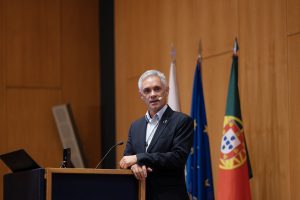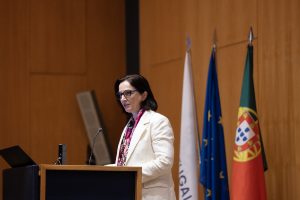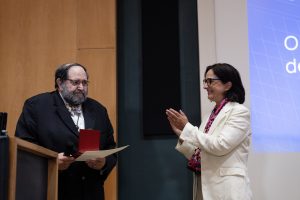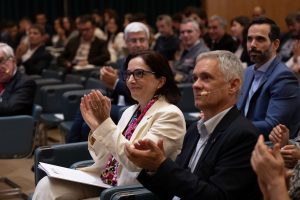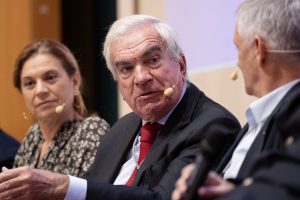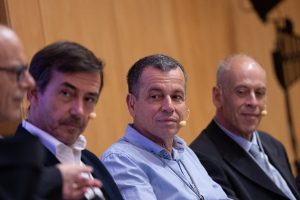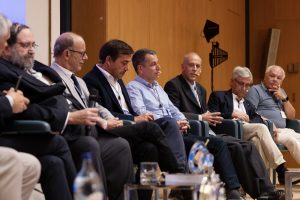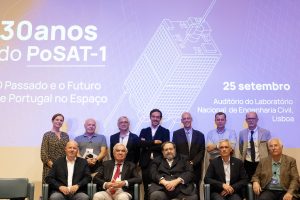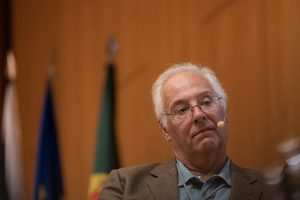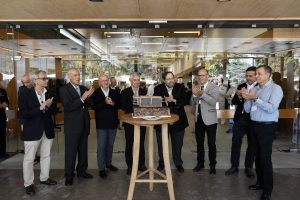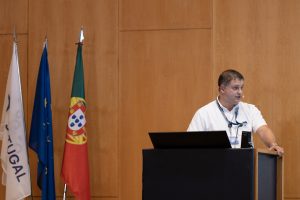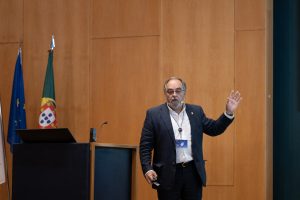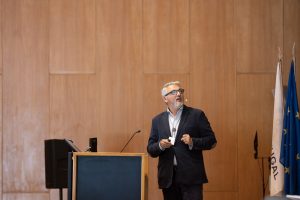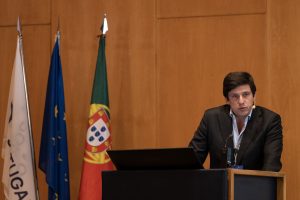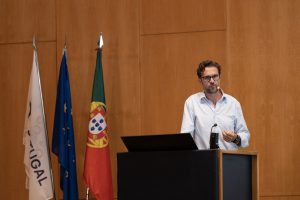Minister of Science awards Fernando Carvalho Rodrigues with the Medal of Scientific Merit
The "father" of Portugal's first satellite was honored by Elvira Fortunato during the event commemorating the anniversary of the launch of Portugal's first satellite: 30 Years of PoSAT-1: Portugal's Past and Future in Space, promoted by the Portuguese Space Agency.
Thirty years after the launch of PoSAT-1, the first (and so far only) Portuguese satellite to be launched into space, Fernando Carvalho Rodrigues received the Medal of Scientific Merit. The head of the PoSAT-1 consortium received the award last Monday from the Minister of Science, Technology and Higher Education, Elvira Fortunato. The ceremony took place during the event 30 Years of PoSAT-1: Portugal’s Past and Future in Space, organized by the Portuguese Space Agency at the National Civil Engineering Laboratory in Lisbon.
Elvira Fortunato highlighted the role of Carvalho Rodrigues “for the vision he had 30 years ago” as the head of the consortium that took the first Portuguese satellite into space. The minister recalled the importance of PoSAT-1, which marked the beginning “of Portugal’s presence in space”, considering it “the forerunner of three decades of various initiatives in this field” that paved the way for “the options the country needed to build its modernity”.
The satellite, launched at 2:45 a.m. (Lisbon time) on September 25, 1993, aboard the Ariane 4 rocket on its 59th flight, from the European Space Center in Kourou, French Guiana, was “designed, developed, built and launched thanks to a consortium of universities and companies from Portugal”, such as INETI, EFACEC, MARCONI, OGMA, UBI and CEDINTEC, among others, and there was also international cooperation, Elvira Fortunato also pointed out.
Several representatives of these companies and institutions, as well as members of the various branches of the Portuguese Armed Forces, attended the Portuguese Space Agency’s event, which aimed to look back on the past and celebrate it, but also to look forward to the future.
The morning opened with the premiere of the Portuguese Space Agency’s documentary “30 Years of PoSAT-1”, which is now available on Youtube. The documentary covers the technical, political, financial and logistical aspects of PoSAT-1’s history, with testimonies from Carvalho Rodrigues, Mira Amaral (Minister of Industry and Energy at the time), José Rebordão (technical director of PoSAT-1 and INETI representative at the time), Deodato Cardoso (former OGMA engineer) and the president of the Portuguese Space Agency, Ricardo Conde.
After viewing the documentary, these and other members of the PoSAT-1 team were called on stage for a chat to share memories and curiosities. For Ricardo Conde, “the celebration of the 30th anniversary of the launch of PoSAT-1 could not go unnoticed”. “Commemorating this day by paying tribute to the team that made the launch of Portugal’s first satellite possible is of great importance to the Portuguese Space Agency. This team inspired the Portuguese space sector and today, 30 years later, our country has a promising future,” he said.
The next Portuguese satellites
If the timetable doesn’t change, PoSAT-1 could soon be accompanied by three other Portuguese satellites. These three projects, as well as others in development, were discussed during the panel “Portugal’s Future in Space”, which took place in the second part of the conference, in a conversation moderated by Joan Alabart, industrial relations manager at the Portuguese Space Agency.
AEROS is in the final stages of preparation, almost finished with the vibration tests – which simulate the impacts of the launch on the rocket. The satellite, which is the result of the work of a consortium led by Thales Edisoft Portugal, is scheduled to fly in February 2024 aboard SpaceX’s Falcon 9.
By the end of 2024, ISTSat-1, developed by Instituto Superior Técnico under the ESA Flight your Satellite program and financed by Portugal, and uPGRADE, developed by Spinworks, could be launched. ISTSat-1 is ready for launch, but will only be on board Ariane 6’s (long-awaited) maiden flight.
The group of small satellites also includes Constellation Magal (Efacec) and Newsat (Stratosphere). Among the initiatives conceived within a more commercial and industrial framework, the VDES (Lusospace), SAR (idD) and VHR/HR Optics (GEOSAT) Constellations were presented. The latter is the only Portuguese company, and one of the few worldwide, with two very high-resolution satellites already in operation.
“We’re working towards Portugal having a constellation of around 30 satellites by 2026, which will allow us to access data with the frequency and resolution needed to manage and monitor the territory,” explained the president of the Portuguese Space Agency, stressing the importance of satellite images for disaster mitigation or surveillance of the exclusive economic zone.

